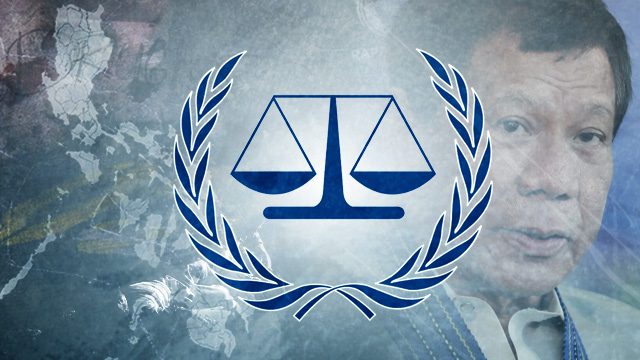SUMMARY
This is AI generated summarization, which may have errors. For context, always refer to the full article.

MANILA, Philippines (UPDATED) – The preliminary examination into the drug war and human rights situation in the Philippines will not be affected by the “withdrawal” of communication by lawyer Jude Sabio, the International Criminal Court (ICC) said on Tuesday, January 14.
“Any purported withdrawal of the communication would have no impact on the ongoing preliminary examination,” the ICC’s Office of the Prosecutor (OTP) told Rappler in an email late Tuesday night.
Sabio sent to the OTP on Tuesday his sworn affidavit withdrawing his communication against President Rodrigo Duterte, only one of the 52 communications filed on the human rights situation in the Philippines.
Sabio said he no longer wants to be used by the “political propaganda” of the opposition.
The OTP said that, under Article 15 of the Rome Statute, “communication cannot be withdrawn.”
“During the preliminary examination, the relevant assessment conducted by the Office is based on information available from wide range of a reliable sources. The Office is notably not limited by the information or allegations contained in individual communications received under article 15 of the Rome Statute,” said the OTP.
The OTP reiterated Prosecutor Fatou Bensouda decided to open a preliminary examination “following a careful, independent, and impartial review of a number of communications and reports documenting alleged crimes.”
In the preliminary examination, Bensouda will determine whether the ICC has jurisdiction over the case which will be established if she proves that the Philippine system is unable or unwilling to investigate the abuses by itself.
Rappler’s analysis found that the Duterte government has allowed thousands of the killings to go unsolved, owing to systematic gaps in the police and prosecutorial levels.
If she establishes jurisdiction, she will ask permission from the Pre-Trial Chamber (PTC) to open a formal investigation. During investigation, PTC judges can issue summons and even arrest orders.
Bensouda says she will make a recommendation by 2020.
Several communications filed with the ICC named Duterte as respondent, as well as former police chief Ronald Dela Rosa.
How the Philippine government responded: Malacañang denounced the ICC’s announcement.
In a statement on Wednesday, January 15, Presidential Spokesperson Salvador Panelo insisted that the international court had no jurisdiction to probe Philippine affairs as he alleged that the Rome Statute was never in effect since it was not published in newspapers after the country ratified it in 2011.
This was among the arguments President Rodrigo Duterte made in withdrawing from the ICC in 2018.
“That it continues to accept communications from entities and persons relative to complaints on human rights against Philippine President Rodrigo Roa Duterte only demonstrates its continuing ignorance of the very source of its being,” Panelo said. – with a report from Sofia Tomacruz/Rappler.com
Add a comment
How does this make you feel?
There are no comments yet. Add your comment to start the conversation.